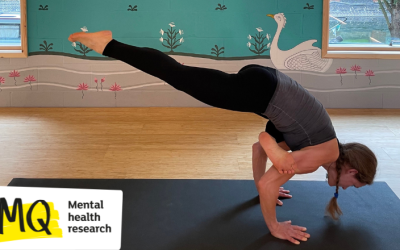This weekend is Eurovision, for some this year might be controversial but for others it's a break from the woes and worries of modern life and a chance for all European countries – and some non-European – to come together to celebrate more than just music. MQ staff member, Juliette Burton, explains why for her Eurovision has helped her mental health.
I have loved watching Eurovision since I was very young. I have happy childhood memories of being allowed to stay up, wrapped in blankets, sitting on the kitchen floor watching it on a TV screen. I remember proudly learning all the lyrics to Katrina and The Waves and creating a dance routine for Love City Groove. At the time, looking back, I was struggling also with early symptoms of anxiety disorder, depression, eating disorders and more but this evening of pure joy, colour, inclusivity and celebration seemed to reach beyond all my distressing thoughts and feelings. I know, for me, watching Eurovision is good for my mental well-being.
Music helps you express feelings
In 2022, I watched Eurovision in the midst of what I can now understand was deep clinical depression. The refrain of Cornelia Jakobs singing Hold Me Closer from Sweden gave me permission to cry the tears I’d been holding onto deep within me for a long time. Those tears were like an internal massage, painful but letting go of emotions stuck for so long, too long.
Scientific research supports the idea that repressing emotion can be linked to physical ill health. Research has also shown that repressing emotions endangers both physical and mental health. So crying could be good for you. Repressing emotions, thoughts, appetites, identity, as Freud alluded to, can be detrimental to mental health.
Music improves your mood
Not only is music therapy an important tool in mental health treatment. Music can increase dopamine, decreases stress hormones and reduces heart rate, research has shown. So listening to the music of Eurovision can help you manage your stress levels which can prevent mental health conditions.
In 2022, the euphoric otherworldly octaves and heightened perspective lyrics of Sam Ryder’s Spaceman soared above the depression landscape I could see. It rose with his voice above political division, economic fears, personal fears. Some amount of hope started creeping in. His commitment to “stick around” despite having “been down some black holes” reminded me of my resolve to simply keep going… to stay.
Power to the People
Last year for the first time, entries from each country are purely down to the public vote, not even affected by a judging panel. There’s clarity and honesty in the voting system at Eurovision. You can now vote for your favourite as long as it’s not your own country and you can see how the votes add up as the evening progresses on the final night. Research shows that autonomy is an important aspect of mental health and can help to aid improvement in recovery.
Music can help schizophrenia symptoms
When I was sectioned for anorexia in 2002, I experienced hallucinations due to stress. In those hallucinations I regularly heard music, danced to music, sang to music no one else could hear. While I made a full recovery from those audible and visual psychotic experiences, I remember the messages I heard from the music. I remember the power that music had over me. And it continues to in a way I can use as a tool.
While studies have shown headphone therapy can help aid those with auditory hallucinations,, and based on research music can be recommended to those with schizophrenia, on a day to basis now for me without music helps me more than many things in managing my mental health.
Recently, during a bout of depression, I told a close friend “When you can’t reach me, send music”. He has taken this to heart and regularly send me music as a means of communicate when just words won’t do.
Mental Health Advocacy
In 2016, Norway’s singer Agete was open about her depression and cancelled all press interviews in the run up to the competition to manage her mental well-being. The then head of Norway’s Eurovision division, Stig Karlsen said of her "In Norway, she's very successful and she's a role model for dealing with her challenges."
As a young child on the way to kindergarten, before any obvious signs of mental health concerns, on the way to school, my wonderful mother used to play the Eurovision favourites Abba on cassette tape. In recent years certain members of the band have also been open about their mental health struggles. My favourite Abba song from that early age was Thank You For The Music. Given the above evidence, I think that sentiment holds fast.
Events like Eurovision give hope
Hope, while it’s an ambiguous term, has been shown to be a key factor in mental health recovery. And through this glittery glorious nonsense night of music I personal have always found hope. No matter what, for want of a better word, crazy choices governments or nations have made, no matter how insane the world feels to me, the silliness and sincerity of the performers at this night to me celebrates the best of humanity. Silliness and sincerity seem to me good ingredients for hope, which while it can’t be quantified or fully understood, it is imperative to mental health.
In times of division, music, like all art, theatre, creativity, can both unite, express, explore what it means to be human. MQ explored the science behind why being creative can be good for your mental health in this article.
So, this weekend, I hope you can embrace the colour, chaos, campness, conviviality and community if you can of Eurovision.
Read more about how creativity, be it music, art, writing or anything, can help your mental health in this article.



